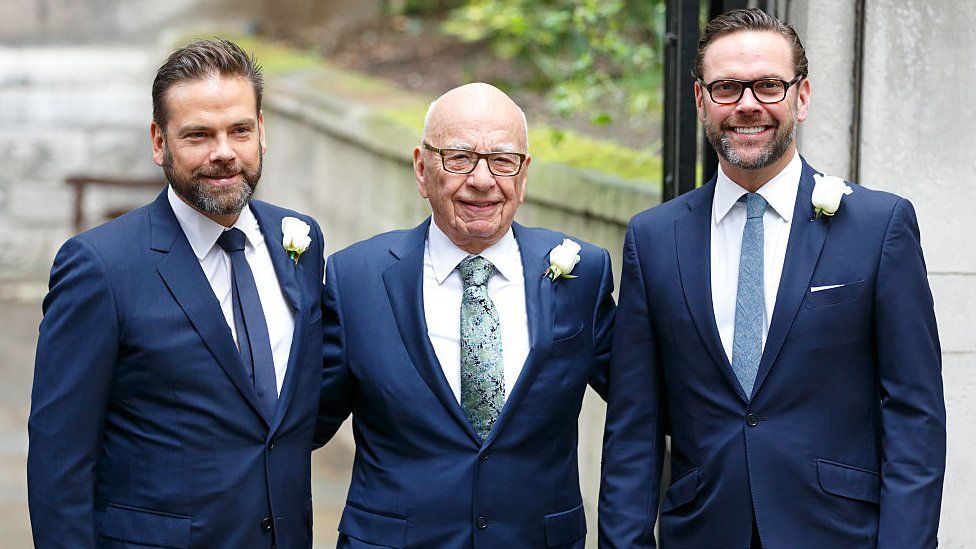Four months after the finale of acclaimed TV series Succession, it seems the show’s real-life inspirations have reached the conclusion of their own succession drama.
When Succession writer Jesse Armstrong appeared at the Edinburgh TV Festival last month, he confirmed what most people already knew – the Murdoch dynasty was the original inspiration for his story of brutal power struggles and backstabbing within a the family of a media mogul.
Armstrong said he changed his characters significantly and also drew on other major families like those headed by Sumner Redstone and Robert Maxwell.
But the fundamental similarities between the Succession characters and the Murdochs remain too tasty to dismiss.
A formidable, decisive and ageing patriarch. Three adult children vying for position in the family business. A media empire struggling to adapt and survive in the digital age.

From the 1960s, Rupert Murdoch built up News Corporation into a globe-spanning behemoth with mighty political and public influence. It included papers like the Sun and the Times in the UK, the Wall Street Journal and Fox News in the US, and Hollywood film studio 20th Century Fox.
Murdoch himself was courted by potential prime ministers and presidents who believed his blessing could make or break their electoral chances.
Following in his footsteps were children Elisabeth, Lachlan and James.
Their father groomed the two boys for the top job, according to former Sunday Times editor Andrew Neil.
“Family has always been very important to Rupert Murdoch, particularly from the point of view of forming a dynasty,” he told 2020 BBC documentary The Rise of the Murdoch Dynasty.
Neil recalled having dinner with Rupert one Saturday night in the mid-80s after sending the Sunday Times to the printers. Lachlan and James, in their teens, were there too.
“The talk was all then about how he was building a company for them,” he said. “And he used to like to play them off against each other to see how they would survive.
“He always wanted at least one of his children to take over from him.”
Elisabeth wasn’t included in this succession planning at that time. “He didn’t really think women could do that sort of thing,” Neil told the Spectator’s Americano podcast earlier this year. “I think over time he may have changed his mind.”

For her part, Elisabeth said in 2012 she had said “absolutely no ambition” to succeed her father. She had been was managing director of Sky Networks, part owned by News Corp, but left to set up her own successful TV production company, Shine, in 2000. That was bought by News Corp in 2011.
James was for many years the heir apparent. He held a number of senior positions in his father’s empire including head of the London-based newspaper arm and chairman of satellite broadcaster BSkyB.
But after the phone hacking scandal engulfed the company in 2011, leading Rupert to close the News of the World newspaper, James resigned from News International and BSkyB.
He took over from his father as chief executive of the renamed 21st Century Fox in 2015. But that studio was bought by Disney in 2019, and the following year James resigned from the board of News Corp over editorial “differences”.
In particular, he made no secret of his displeasure with the right-wing direction of Fox News and of coverage of climate change by his father’s outlets.
That cleared the path for Lachlan, who had been the first of the trio to join the board of the family firm when he became executive director in 1996, having earlier worked at Murdoch papers and TV stations in Australia.
But he abruptly left in 2005 and moved back to Australia. He returned to the family fold a decade later, however, and became executive chairman of 21st Century Fox and chairman of News Corp, alongside his father.
“It’s been pretty clear for about a decade now that Lachlan was the chosen son,” Vanity Fair special correspondent Brian Stelter told BBC News after Thursday’s announcement.
“James Murdoch is disgusted by what airs on Fox News in the US. He has moved away from the companies. So Lachlan has been in line for a while, but he’s always been sharing power with his father.”

In April, Vanity Fair published an expose of the family infighting, which claimed that the ageing and ailing mogul was “consumed with the question of his succession”.
“Murdoch believed a Darwinian struggle would produce the most capable heir,” Gabriel Sherman wrote in the magazine. he added: “The central fault line remains the rift between James and Lachlan.”
The article even claimed Lachlan suspected James of feeding stories to Succession’s scriptwriters, and that the divorce settlement between Rupert and Jerry included a stipulation that she couldn’t give story ideas to the show’s writers.
Earlier this year, Jesse Armstrong said people questioning the inspiration for his storylines had asked “did the Murdochs whisperer in your ear?”
He replied: “No, we read Vanity Fair – they’re slagging each other off in the pages… You don’t need to go for lunch with those people.”
Like in Succession, there is another sibling – Prudence – who has been less involved in the media. (Unlike Logan Roy, Murdoch also has two more offspring who are much younger, in their early 20s.)
Vanity Fair also quoted two sources as saying James was biding his time until he and his sisters could wrest control from Lachlan after Rupert is gone. “James, Liz and Prudence will join forces and take over the company,” one former Fox executive told the magazine.
As with a hit TV show that could come back for a spin-off or sequel in future years, the Murdoch drama may not be over.
